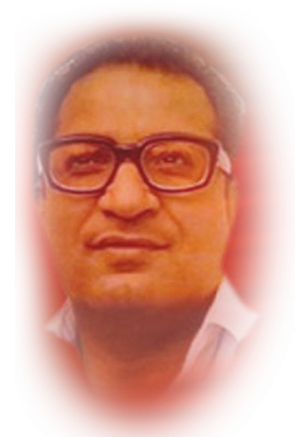about him
The Indian political scene is reputed to change by the day. People claiming to be part of value-based politics can so easily change and support a diametrically different philosophy the next day to just grab the headlines. No wonder, our people just mock at such politicians irrespective of their claimed political philosophy. In the initial days of pre independence, the congress party and in post independence, the socialists have struggled to revitalize and build a healthy society. Dr. Ram Manohar Lohia is the main thinker and architect of socialism in India. Having been attracted to the philosophies of Marx, Trotsky and Lohia at a very young age, Venkatram devoted his entire life for the welfare of the working and downtrodden class and died prematurely at 57.
Closely associated with Dr.Lohia, H.V.Kamat, N.G.Goray, Madhu Limaye, George Fernandes, Rabi Ray, Madhu Dandavate at the national level and with Shantaveri Gopala Gowda in Karnataka, Venkatram was one of those who laid the foundation to the socialist movement. To many of the young politicians in the 60's and 70's, Venkatram was an inspiration. Even though, he was the president of All India HMS, he still managed to give equal importance to resolve an issue with even the smallest of trade unions. Because for him, it was not the number but the resolution of issues which was more important.
Born on 24th July, 1924, Venkatram was the only son of Channappa and Narasamma from Sadali village in Kolar District. He completed primary education at Handenahalli in Bangalore district and later studied at National High School, Bangalore. After completing Diploma in Civil Engineering from Mysore University, he worked as a Draftsman with Central Government, Bombay.
While working in the Government, Venkatram entered active politics and joined Congress Socialist Party in 1945 and became its Ward Secretary. From 1947-51, he worked as the Secretary of the party. Later from 1955 to 1968, he functioned in various capacities in Karnataka. From 1968 to 1971, he worked as the Joint Secretary of All India Samyuktha Socialist Party and from 1974 to 1977 as Secretary of Central Parliamentary Board. He was also the General Secretary of the Unified Janata Party, Karnataka.
Venkatram entered the trade union movement in the year 1947. The aftermath of world war was so serve on the trade union movement, that organizing labour was a very important requirement of those days. He was the focal point of organizing Bank and Government workers. When his trade union activities reached a crescendo, he was rewarded by the government with dismissal.
Venkatram reached Bangalore in 1952 without any shelter, and no source of income. He had no other option than to admit his wife Saroja to Government Ayurvedic Hospital to ensure some food and shelter to her, while he managed on the streets. Finally, he joined Minerva Mills Workers union at a monthly salary of Rs.50/-per month. The union office became his house and within a year, he became the president of the union. It is a great inspiring story that an ordinary office bearer of a small trade union was to represent the country at International level later. His strengths of sincerity and devotion to the cause, his determination and ability to withstand and surpass extreme personal difficulties and above all his strong belief that welfare of the working and downtrodden was the sole purpose of his life ensured that he achieved commanding heights in the Indian Trade union movement.
From 1952 to 1979, he was the undisputed leader of Cotton Mill workers, Printing, Dairy, Government and Sugar workers. From 1969 to 1971 he led the Cotton Textile Workers of Delhi and Coal and Mine Workers of Bihar. He founded the Karnataka Sugar Workers Federation and was its President and also President of All India Petro Chemical Workers Union at the time of his death. He held various positions such as secretary, Hind Mazdoor Sabha between 1952 to 1962, as General Secretary HMS, Karnataka from 1970 to 1974, President All India Hind Mazdoor Panchayat, from 1974 to 1979 and as All India President of unified HMS from 1979.
He was imprisoned several times in his long political, Trade union and citizens' movement in the country. During the historic NGO's strike in 1967, he was illegally imprisoned. When emergency was declared on June 25th 1975, he went underground and organized opposition and was arrested and imprisoned under MISA during 1975-1977.
The formation of the Janata Government and its break up due to internal conflicts and the division of the party of which he was one of the founders made a deep impact on him. He was totally disillusioned with party politics and remained a neutral observer of the disintegration of the Indian political system.
As president All India HMP, he traveled to Russia in 1978 and represented India at the ILO meet, Geneva in 1979.
Despite his busy schedules and participation in various struggles, he remained a voracious reader and a prolific writer. Three of his works the Sahithya Academy award winning 'Pradakshine' (a travelogue in Kannada), Dudiyuvara Dani and Karmikara Vivida Prashnegalu have been published.
He introspected and propounded a powerful and appropriate federal system as an alternative. However, for those Socialists who had already tasted power, there was no inclination to sacrifice power and rebuild the nation. Being a born fighter, he stuck to his philosophy and continued to inspire and organize the youth. He had made preparation to organize the farmers, the workers and women under the banner of Karnataka State Farmers and Workers Parishat. However, fate did not allow this to happen. He lost consciousness due to severe Jaundice and physically left us on 20th January 1981. He left behind his wife Saroja, two sons and two daughters, and thousands of admirers for whom Venkatram remains an inspiration for their life.

